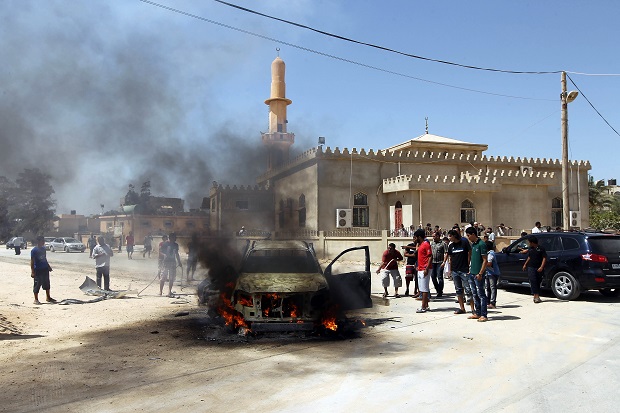Recent news from Libya has not inspired confidence. Terrorism, riots, murder, a temporarily kidnapped prime minster, oil stuck at export terminals – it’s a dispiriting litany of apparently unconnected events. Yet careful study of the region’s history and the aftermath of the uprisings against Colonel Gaddafi suggest that peripheral forces in Libya are, as they often do, resisting impositions from the centre. That is the central thesis of a collection of essays The 2011 Libyan Uprisings and the Struggle for the Post-Qadafi Future, edited by Jason Pack of Cambridge University.
Pack & Co argue that the Libyan uprising was not homogenous. There were ‘multiple simultaneous uprisings’ far away from Colonel Gaddafi’s powerbases in Tripoli, Sabha and Sirte, in areas of the country where his writ ran courtesy of local strongmen and tribes. Gaddafi was never strong enough to assert his dictatorship in these regions. His authority evaporated in Tobruk because local militia would not fire upon their brothers. A similar pattern emerged across Cyrenaica (eastern Libya) and the rebellion gathered pace.
On 27 February 2011, a group of rebels formed the National Transitional Council (NTC) in Benghazi to act as the political front for the various rebel groups; a move designed to attract international support for the cause and to provide an administrative centre. While the NTC convinced NATO and others to institute a no-fly zone, it failed to provide adequate civilian administration. Bickering opened between revolutionary youths, tribal militiamen and Islamist elements as the rebellion struggle to maintain order. Matters came to a head on 28 July 2011, when NTC defence minister General Abdul-Fattah Yunis, a former Gaddafi official, was assassinated.
The country is still living with the consequences of that murder, because it pitted radical elements, especially the Islamists and liberal youths, against other interests in the NTC. Political cohesion was lost, even as rebel trucks motored to Sirte to give Gaddafi his comeuppance. Yet the remarkable thing about the NTC and its successor, the General National Congress, is that they are still regarded as legitimate. There was and is no credible internal threat to the state. As Pack puts it in his introduction, ‘the notion of dismantling the Libyan state was anathema to most [rebels] and stigmatized as treason.’
High-politics in Libya is obviously chaotic; but the picture on the ground is encouraging in some locales. The economy and civic society have been flourishing in Mistrata and Tobruk; but violent unrest has broken out in both towns in recent days. Why? You can bet your bottom dollar that locals became fed up with ill-conceived and cack-handed central government initiatives. For example, in the absence of adequate security forces and an effective judicial system, the central government in Tripoli has tried to use warring militias to provide local muscle. This is a continuation of Gaddafi’s policy; and, as the present wave of violence suggests, time has not improved it.
The targets of recent protests are instructive. In Tobruk, an oil terminal was closed and the offices of the state-owned oil company were blockaded. Meanwhile, in Mistrata, scene of a bitter siege during the revolution, it seems that former revolutionaries reacted badly to taking orders from administrators dispatched from Tripoli, some of whom were Gaddafi loyalists responsible for the carnage of the siege.
Pack & Co make a convincing case that central government, supported by the western allies and their aid agencies, must ‘localise’ (devolve) power by giving the various strongmen a stake in the administration of justice, the economy and the development of public services. Only then, they argue, can Libya build strong civic institutions to withstand greater tremors than those of the moment.
The 2011 Libyan Uprisings and the Struggle for the Post-Qadafi Future, edited by Jason Pack, is published by Palgrave Macmillan.






Comments